National
Trudeau gov’t considers ban on portable electric heaters while Canadians struggle to afford to stay warm

From LifeSiteNews
Health Canada has opened a 90-day consultation period titled “Comment period for the danger to human health or safety assessment for portable electric heaters” for stakeholders as well as the public to give digital comments via email on their opinions if the heaters should be banned.
Canadian officials are looking for sufficient “information” from a variety of stakeholders on the use of popular portable electric heaters over “safety” issues while attempting to ban the devices despite the fact the government has made heating homes more expensive due to a punitive carbon tax.
Health Canada, with a notice posted on its website, has now added portable electric heaters as a hazardous consumer product because they can “pose a danger to human health or safety.”
Going one step further, Health Canada has opened a 90-day consultation period titled “Comment period for the danger to human health or safety assessment for portable electric heaters” for stakeholders as well as the public to give digital comments via email on their opinions if the heaters should be banned.
“Health Canada will consider these comments when making a determination on whether there is a danger to human health or safety posed by these products,” the agency noted.
According to Health Canada, if it cannot gather enough evidence that compact electric heaters do indeed pose a safety risk, the devices will not be banned.
The consultation period opened on February 19 and will close on May 19.
The Trudeau government is trying to force net-zero regulations on all Canadian provinces, notably on electricity generation, as early as 2035. His government has also refused to extend a carbon tax exemption on heating fuels to all provinces, allowing only Atlantic provinces this benefit.
According to Statistics Canada, “Energy Poverty,” which could be described as one not being able to “maintain healthy indoor temperatures” throughout the year, is an issue nationwide. Due to the carbon tax imposed by the Trudeau government making everything more expensive, many Canadians are struggling to afford basics like electricity, water, and, most important for winter weather, natural gas for furnaces.
Indeed, a recent report released by McGill University shows that about one-in-five Canadian households face some form of “energy poverty” due to high utility costs.
Last fall, Statistics Canada released findings showing that 14% of Canadians dealt with “unsafe or uncomfortable temperatures” inside their homes no less than four weeks out of the year.
The irony of the Statistics Canada report is that, as reported by LifeSiteNews, Trudeau’s carbon tax is costing Canadians hundreds of dollars annually, as government rebates are not enough to compensate for high fuel costs.
Franco Terrazzano, federal director of the Canadian Taxpayers Federation, told LifeSiteNews last month that “If the government wanted to make all areas of life more affordable, the government should leave more money in people’s pockets and cut taxes.”
“Trudeau should completely scrap his carbon tax,” he added.
The electric heaters being investigated include portable baseboard heaters, fan-driven heaters, electric-only heaters, and liquid-filled radiator-style heaters. Health Canada claims that the heaters can cause a fire hazard due to faulty wiring and can overheat.
It should be noted that in many countries such as Mexico portable electric heaters are the norm. While they can pose fire hazards, most modern heaters incorporate automatic shutdowns should the devices be knocked over.
Heaters that are permanently connected are not under review.
Health Canada says that there have been 252 reported incidents, with five deaths and 10 injuries, from 2011 to 2023.
As for Trudeau’s carbon tax, it has made everything more expensive. A report from September 5, 2023, by Statistics Canada shows food prices are rising faster than headline inflation at a rate of between 10% and 18% per year.
According to a recent Statistics Canada survey of supermarket prices, Canadians are paying 12% more for carrots, 14% more for hamburger (ground meat), and 27% more for baby formula.
COVID-19
Trudeau government only sought legal advice after Emergencies Act was invoked, records indicate
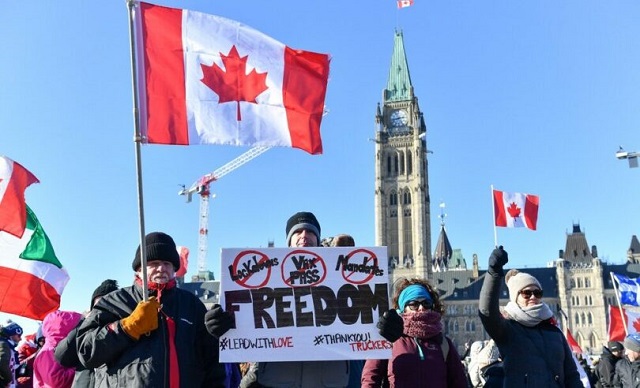
Canada’s Freedom Convoy in Ottawa Minas Panagiotakis/Getty Images
From LifeSiteNews
The two-page Memorandum For The Attorney General was dated February 15, 2022, and was written by the deputy director of prosecutions. The date of the memorandum is significant, as it comes after Trudeau had invoked the EA on February 14.
A Conservative MP’s request for information has revealed that the cabinet of Prime Minister Justin Trudeau waited until after it had invoked the Emergencies Act (EA), which was done to take down the peaceful Freedom Convoy, to get legal advice from Canada’s Attorney General on whether its use was lawful.
As noted in a recent Blacklocks’s Reporter article, Access To Information records obtained by Conservative MP Arnold Viersen from the office of the Attorney General confirm what many MPs have been suspicious of for years, that Trudeau’s use of the EA was not really warranted.
“I filed an Access To Information request for the memorandum on the Emergencies Act sent to the Attorney General from the Public Prosecution Service,” MP Viersen said in a statement to the media.
“What did they advise the Attorney General? We will never know because Justin Trudeau censored it.”
The documents, despite being censored, do reveal that the two-page Memorandum For The Attorney General was dated February 15, 2022, and was written by the deputy director of prosecutions. The date of the memorandum is significant, as it comes after Trudeau had invoked the EA on February 14.
Trudeau’s Attorney General Arif Virani, during testimony on February 28, said that there was a legal opinion offered regarding whether the use of the EA would be justified, but that its contents had to remain confidential.
This claim of secret legal advice has never been substantiated.
In early 2022, the Freedom Convoy saw thousands of Canadians from coast to coast come to Ottawa to demand an end to COVID mandates in all forms. Despite the peaceful nature of the protest, Trudeau’s government enacted the EA on February 14, 2022. Trudeau revoked the EA on February 23.
Earlier this year, Canada’s Federal Court announced that the use of the EA by the Trudeau government was a direct violation of the nation’s Charter of Rights and Freedoms, and thus was “not justified.”
Of note is that the judge who ruled Trudeau’s government’s use of the EA was “not justified” was Federal Court Justice Richard Mosley, a Liberal-appointed and well-respected judge with decades of experience.
The Trudeau government has since appealed the court’s decision.
I do not ‘believe for a second’ the ‘threshold’ was met to invoke EA
Conservative MP Glen Motz told a February 28 hearing of the Special Joint Committee on the Declaration of Emergency that he did not believe for a “second” that the “broader interpretation even existed,” in terms of the legality of the EA’s use.
“I still believe more strongly today than I did in 2022 that the circumstances to invoke the Emergencies Act were not met,” he said, noting that “The threshold was not met.”
“I agree with Justice Mosley in his decision that it was in fact illegal and unconstitutional,” he said.
The EA controversially allowed the government to freeze the bank accounts of protesters, conscript tow truck drivers, and arrest people for participating in assemblies the government deemed illegal.
Before Mosley’s ruling, an investigation into the use of the EA, as per Canadian law, was launched by Trudeau. The investigation, titled the Public Order Emergency Commission, was headed by Liberal-leaning Judge Paul Rouleau. Unsurprisingly, the commission exonerated Trudeau’s use of the EA.
During the clear-out of protesters after the EA was put in place, one protester, an elderly lady, was trampled by a police horse, and one conservative female reporter was beaten by police and shot with a tear gas canister.
Last month, LifeSiteNews reported that Conservative MP Marilyn Gladu uncovered that the federal government of Trudeau spent $2.2 million in taxpayer money in a failed attempt to try and stop court challenges filed against it for enacting the EA to stop the peaceful Freedom Convoy.
Freedom Convoy leaders Tamara Lich and Chris Barber have been in a ongoing legal battle with federal officials.
COVID-19
More victories for freedom as ArriveCAN charges dropped and fines reduced

Gheorghe and Carmen Neferu
News release from The Justice Centre for Constitutional Freedoms
The Justice Centre for Constitutional Freedoms is pleased to announce that it continues to see dropped charges and significantly reduced fines for Canadians who allegedly violated the Quarantine Act or who chose not to use the ArriveCAN app at Canadian borders.
The Justice Centre has provided defence counsel to eight Canadians who chose not to comply with a mandatory ArriveCAN.
Added together, these eight Canadians received a total of 13 tickets, with combined fine amounts totalling $54,815. Defence counsel provided by the Justice Centre negotiated with the Crown to secure admissions that amounted to fines totalling $1,216, not $54,815. All hearings for these cases were scheduled to take place in April at the Ontario Court of Justice in Mississauga, Ontario.
Here are their stories.
Cory Thorn, along with his wife, Guiseppina Lamacchia, their two small children and Guiseppina’s mother Carmela Lamacchia, were returning from a trip to Italy on September 8, 2022, when they were stopped at the Canadian border. They had not downloaded the ArriveCAN app because they did not feel comfortable with the app. They asked if they could submit the required information on paper but were told they could either use the app or face fines. The three adults were given two tickets each, one for $955 and another for $6,255. Together, the family faced a total of $21,630 in fines for violating two sections of the Quarantine Act: section 58, failing to comply with an order prohibiting or subjecting to any condition the entry into Canada and section 15(1), failing to answer a relevant question asked by a screening officer or to provide the officer with any required information or record. Their trials were scheduled for April 15, 2024. Five of the six tickets were dismissed. Carmela pled guilty to one charge and received a reduced fine of $615.
On September 22, 2022, a mother and her adult daughter, who have requested anonymity, were returning from a trip to Italy when they were each fined $6,255 for failing to use the ArriveCAN app. The women felt uneasy providing private health information through the ArriveCAN app. They offered to provide the information orally to border officials. Their offer was refused. Each had trial dates set for April 23, 2024. The daughter’s charge was withdrawn by the Crown, while her mother pled guilty and paid a significantly reduced fine of $300.
Daniel Sauro and his partner, Gina Campoli, traveling with their one-year-old daughter, returned from a family vacation on September 24, 2022, when each adult was issued a ticket for $6,255 under section 58 of the Quarantine Act for not using the ArriveCAN app. They were uneasy about disclosing private medical information and were concerned about the app’s security. Their trial was scheduled for April 18, 2024 -nineteen months after the tickets were issued. The public health officer did not appear at trial, and so the prosecutor was forced to withdraw all charges.
Gheorghe and Carmen Neferu traveled back to Canada from abroad on August 3, 2022, when they were each given two tickets with fines for failing to use the ArriveCAN app, totaling $14,420 They did not want to answer invasive questions regarding their medical status. Their trials were scheduled for April 8, 2024. The charges against Carmen were withdrawn, while Gheorghe had one charge withdrawn. He pled guilty to the other, paying a reduced fine of $300.
A constitutional challenge to the ArriveCAN app requirement continues to proceed in the Ontario Court of Justice.
Chris Fleury, lead counsel on the Charter challenge to the ArriveCan app requirement, says, “Each and every Canadian who refused to provide their vaccination status via ArriveCAN was also subject to a mandatory 14-day quarantine in addition to their ticket. The quarantine had no scientific or public health basis and was a breach of Canadian’s Charter right not to be arbitrarily detained. While we would have preferred that no one was charged in the first place, we are pleased to see the prosecution taking a more reasonable approach to these cases.”
-

 COVID-192 days ago
COVID-192 days agoThe New York Times Admits Injuries from COVID-19 Shots
-
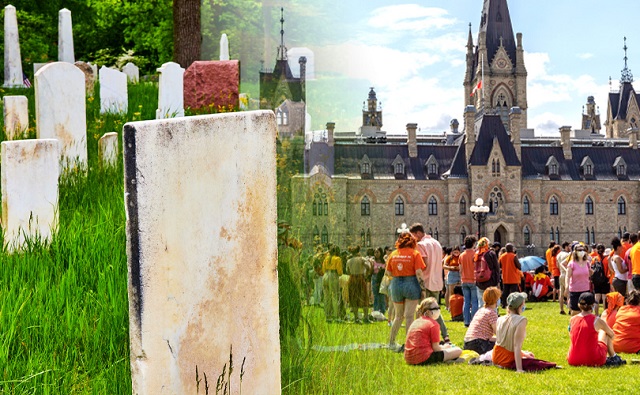
 National1 day ago
National1 day agoDespite claims of 215 ‘unmarked graves,’ no bodies have been found at Canadian residential school
-

 Energy2 days ago
Energy2 days agoFederal government continues to reject golden opportunities to export LNG
-

 Brownstone Institute22 hours ago
Brownstone Institute22 hours agoThe WHO’s Proposed Pandemic Agreements Worsen Public Health
-
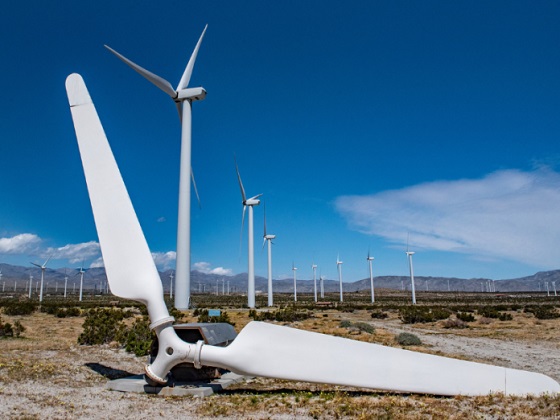
 Energy2 days ago
Energy2 days agoBuckle Up for Summer Blackouts: Wind Is Already Failing Texas in Spring
-
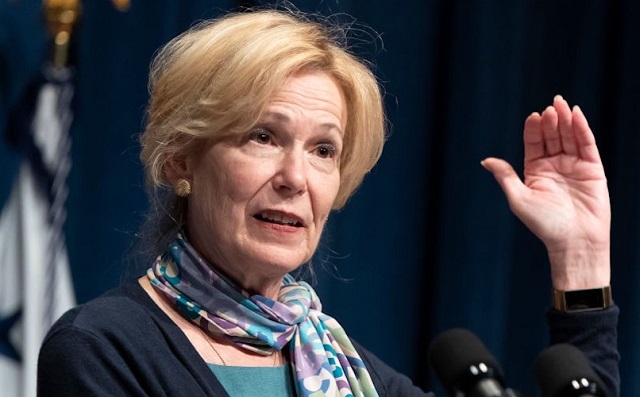
 COVID-192 days ago
COVID-192 days agoFormer COVID coordinator Deborah Birx now admits jabs could have injured ‘thousands’
-
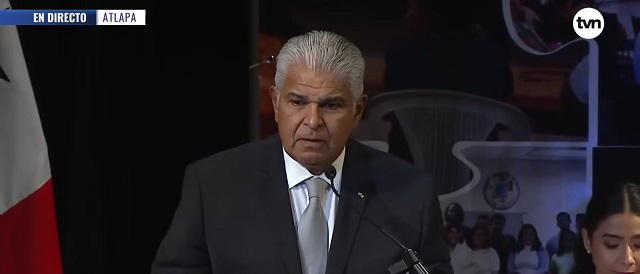
 illegal immigration1 day ago
illegal immigration1 day agoPanama’s Incoming President Wants To Shut Down His Country’s Most Treacherous Route For Migrants — But Will It Work?
-

 conflict2 days ago
conflict2 days ago‘It Makes No Sense’: Experts Puzzled By Biden Admin’s Claim That Rafah Invasion Wouldn’t Help Israel Defeat Hamas






